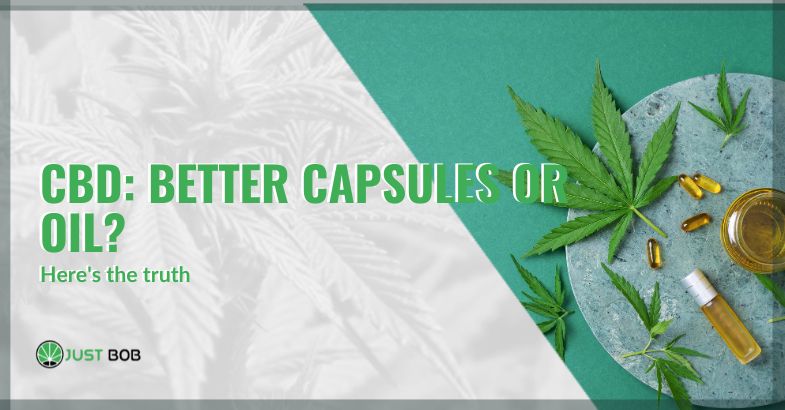Published on: 17/10/2024
Analysis of the pros and cons of CBD capsules and CBD oil to help you decide which form is best suited to your needs and daily lifestyle.
The growing popularity of cannabidiol (CBD) has led to a wide range of products available on the market, edibles, oils and tinctures, creams and body products, but also everything for make-up.
In short, a rapid spread in commerce due to the mainly beneficial properties of cannabidiol. With all this variety, it is difficult to choose which product is best for our health status and can help us in the best possible way.
The choice frequently falls between capsules and CBD oil.
Both forms offer significant benefits, and choosing between the two depends basically, as we shall see, on a personal decision.
This new article by Just bob aims to provide an in-depth overview of the differences between these two forms of CBD intake, highlighting advantages and disadvantages of each option to help make an informed decision.


The role of CBD and the endocannabinoid system: a brief review
Before delving into the difference between capsules and CBD oil, it is important to be clear about how the endocannabinoid system works and how cannabidiol interacts with it. This is essential for the informed and safe use of any CBD product.
Cannabidiol (CBD) is one of the many cannabinoids found in cannabis, particularly in the Sativa variety, and is extracted from the inflorescences of the plant. Unlike tetrahydrocannabinol (THC), CBD is not psychoactive, which means it does not cause euphoria or a ‘high’.
CBD interacts with the human body’s endocannabinoid system (ECS), a complex apparatus of cellular signals that plays a leading role in regulating a range of physiological functions, including sleep, appetite, pain and immune response.
We know that the endocannabinoid system is composed of cannabinoid receptors (CB1 and CB2), endocannabinoids, i.e. molecules that our body produces on its own, and enzymes that synthesise and degrade these endocannabinoids.
Specifically, CBD binds mainly to CB2 receptors, which are predominantly present in the immune system and are the body’s valuable allies in modulating both inflammation and pain.
This interaction mechanism explains many of CBD’s therapeutic benefits, including anxiety reduction, improved sleep and pain relief. Cannabidiol has a natural origin and is therefore increasingly used by those seeking a remedy that comes directly from nature, without the contraindications and side effects that often accompany drug therapies. For this reason, more and more people are choosing it.
However, it is not easy, especially at the beginning, to choose the best form of intake, the one best suited to the individual. Let us therefore go into the differences between capsules and oils in the following lines.
CBD capsules
CBD capsules are an easy and discreet way to take cannabidiol. Similar to vitamins or supplements, capsules contain a pre-measured dose of CBD, which makes them easy to use without the need to measure the amount to be taken each time. They are particularly suitable for those with busy lives who prefer a quick and uncomplicated way of taking.
One of the main advantages of capsules is the lack of flavour. Unlike CBD oil, which can have an earthy or bitter taste, capsules are tasteless and easier to swallow for those who are sensitive to strong flavours.
If one is shy or otherwise dislikes being the centre of attention, capsules provide greater discretion as they can be taken without attracting the stares of others, unlike oil which requires a dropper and may be less practical in public.
Of course, there are not only advantages, we also see limitations that have to do with the timing of the effects in the body.
CBD in capsules has to pass through the digestive system and the liver before entering the bloodstream, which is why it takes longer and more patience to feel the effects than oil taken sublingually
Another limitation of CBD capsules relates to their bioavailability which is considerably lower than that of oils and this is precisely because some of its ability to produce effects is lost during digestion.
Before exploring the pros and cons of CBD oil, visit our CBD shop online to discover the various options available.
Read also: High vs Stoned: understanding different cannabis effects
CBD oil
CBD oil is a versatile and popular option that can be taken both sublingually and orally.
When taken sublingually, CBD is quickly absorbed by the body through the mucous membranes under the tongue. This allows the effects to begin to be felt more quickly than with capsules, making it a particularly advantageous mode of intake for those who need quick relief from anxiety or pain symptoms.
CBD oil is multi-purpose and can be added to food and drink to make it easier to consume. Several people use CBD oil in smoothies, but also in sauces or soups. In this way, they integrate cannabidiol into their daily diet without having to take it separately. This is also a way to avoid the taste that many find unpleasant on the palate of CBD oil.
However, when the oil is ingested orally, it still has to pass through the digestive system, similar to capsules, which may delay the onset of the effects but makes them last longer.
One of the possible disadvantages of using CBD oil is the need to determine the correct dose. Since oils do not have pre-measured doses like capsules do, it is essential to be precise in measurement, which can be complicated for some users. Since oils do not have pre-measured doses like capsules, it is essential to be precise in measurement, which can be complicated for some users.
Read also: Can you really overdose on cannabis? Find out if it is possible!
CBD capsules and CBD oil in comparison
The choice between capsules and CBD oil depends on various personal factors.
Capsules offer a flavourless, discreet and convenient method of intake, ideal for those who want a precise dose and a convenient way of consumption. On the other hand, CBD oil is more versatile and gives faster effects when taken sublingually, as well as being easily integrated into the diet.
In terms of bioavailability, CBD oil tends to have an advantage, especially when taken sublingually, as it avoids the first passage through the liver and allows more CBD to enter the bloodstream.
Capsules, although convenient, may take longer to show effects and may have a lower bioavailability. In short, pros and cons. Let us pause for a moment, however, on an aspect we have only mentioned and which deserves further study.


Bioavailability
Bioavailability is a mlto interesting concept when it comes to CBD cannabis products, as it determines the actual amount of cannabidiol that enters the bloodstream and can exert its effects.
Different forms of CBD administration, such as capsules and oils, have different levels of bioavailability. For instance, capsules, because they must be digested and metabolised by the liver, tend to have a lower bioavailability than CBD oil taken sublingually and directly into the bloodstream through the oral mucous membranes.
The sublingual intake method can lead to a faster and potentially more potent effect than capsules.
Knowing what bioavailability is and what it is helps you choose the most suitable CBD cannabis product for your needs and obtain maximum therapeutic benefits
Conclusions
Both capsules and CBD oil offer significant benefits, and the choice depends on individual preferences and specific health needs. Capsules are ideal for those seeking convenience and discretion, while oil offers more versatility
Before deciding which form of CBD to use, it is advisable to consult a doctor, especially if you are taking other medications or have pre-existing health conditions, to determine the most suitable option.
Furthermore, whatever the choice, it is a good idea to start gradually, starting with low dosages and then increasing over time. This allows the body to adapt to a new element and gives us time to listen to it.
Finally, it is important to choose a quality product regardless of the preferred form. With this information, it will be easier to make an informed decision and find the CBD intake method that best suits your lifestyle.
Takeaways
- CBD capsules are a convenient and discreet method of consumption. They come with pre-measured doses, making them ideal for those with busy lifestyles who prefer a tasteless, hassle-free intake method. Unlike oil, capsules don’t attract attention and are easier to consume in public.
- CBD oil, particularly when taken sublingually, has a quicker onset of effects compared to capsules. This is because it bypasses the digestive system and is absorbed directly into the bloodstream through the mucous membranes under the tongue. This method also offers higher bioavailability, ensuring more CBD enters the bloodstream.
- CBD oil can have a strong, earthy taste that some find unpleasant. However, it is versatile and can be added to food and drinks, allowing for creative integration into daily diets. This versatility makes it a flexible option for those who want to avoid the direct taste of the oil.
- Capsules provide a precise dosage of CBD, which is beneficial for those who need consistency in their intake. In contrast, oil requires careful measurement, which can be challenging for some users. The convenience of capsules is a significant advantage for maintaining a regular CBD regimen.
- Both capsules and oil ingested orally must pass through the digestive system, potentially delaying the onset of effects. Capsules may take longer to produce noticeable effects and might have a lower bioavailability due to the digestive process, whereas oil taken sublingually offers a more immediate response.
FAQ
What are the main advantages of CBD capsules?
CBD capsules are convenient and discreet, providing a pre-measured dose of CBD. They are tasteless and easy to swallow, making them suitable for those sensitive to strong flavors. Capsules are ideal for busy individuals who prefer a quick and uncomplicated intake method.
How does the bioavailability of CBD oil compare to capsules?
CBD oil generally has higher bioavailability than capsules, especially when taken sublingually. This is because the oil is absorbed directly into the bloodstream through the mucous membranes under the tongue, bypassing the digestive system and liver, which can reduce bioavailability in capsules.
What are the potential disadvantages of using CBD oil?
One potential disadvantage of CBD oil is the need to determine the correct dose, as it does not come pre-measured like capsules. This can be challenging for some users. Additionally, the taste of CBD oil can be unpleasant for some, although it can be mixed with food or drink to mitigate this issue.









